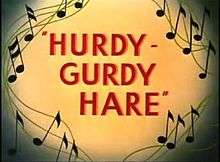Hurdy-Gurdy Hare
| Hurdy-Gurdy Hare | |
|---|---|
| Merrie Melodies (Bugs Bunny) series | |
 | |
| Directed by | Robert McKimson |
| Produced by |
Edward Selzer (uncredited) |
| Story by | Warren Foster |
| Voices by | Mel Blanc |
| Music by | Carl Stalling |
| Animation by |
J.C Melendez Emery Hawkins Charles McKimson John Carey Phil DeLara |
| Layouts by | Cornett Wood |
| Backgrounds by | Philip DeGuard |
| Distributed by | Warner Bros. Pictures |
| Release date(s) |
January 21, 1950 (USA premiere) |
| Color process | Technicolor |
| Running time | 6 minutes 57 seconds |
Hurdy-Gurdy Hare is a Merrie Melodies cartoon short, copyrighted in 1948 and released in 1950 and re-issued in 1961 as a Blue Ribbon, which is directed by Robert McKimson and written by Warren Foster. Bugs has to deal with Grusome Gorilla while trying to make some money playing a street organ.
Plot summary
While Bugs is sitting in Central Park, he looks through the wanted ads, finally focusing on a job as a Hurdy-Gurdy (actually, a street organ), thinking at first of 'the masters - Beethoven, Brahms, Bach' (pronounced by Bugs as 'Beat-hoven,' 'Brammz,' and 'Batch'), but soon thinking of all the money his monkey assistant was able to get from the various apartments he visited. When the monkey tries to stiff Bugs, Bugs chases him off ("Ya' can't trust no one!", he sneers), suddenly thinking he can do the same job as the monkey - but quickly finds out that people willing to give a monkey money aren't willing to give Bugs anything (except a bucket of water on the head).
The monkey runs to the zoo, where he tells a gorilla about what happened (the only intelligible words being Bugs' line "What's up doc? What's up doc? What's up doc?"). The monkey dramatizes being kicked by Bugs, which sends the gorilla in a frenzy. The gorilla breaks out of his cage and confronts Bugs. Bugs tells the gorilla that he's working, but the gorilla threatens him by punching a hole in the wall. Bugs is able to outwit the gorilla by asking the gorilla if he can inflate himself with his finger, causing the gorilla to literally inflate. Bugs tells the gorlla that what he's doing is too immature: "You're a big boy now. Take your finger out of your mouth!". The gorilla obliges, but falls many stories down from the apartment building. At one point, the gorilla gets tricked into unsuccessfully attempting to bounce off, only to crash into, the shaded entryway, falling through the basement and comes up a lift, holding a newspaper and with his arm through a subway window. Bugs, acting as a conductor, orders the gorilla to "push in, plenty of room in the center of the car!", pausing to tell the audience "I used to work on the shuttle from Times Square to Grand Central", before pushing the gorilla back underground again where the train crashes into the gorilla off screen. Then, aping Ralph Edwards' famous declaration on Truth or Consequences, he says to the audience: "Ain't I a devil??".
Bugs then encounters the infuriated gorilla again ("Oh, back again, eh? Well, if you can't take a hint, I'll have to get tough. And another thing...STOP BREATHING IN MY CUP! I'll bet this kid won't take much more of this guff.") A chase then ensues, and Bugs tries getting away from the gorilla on the outside of the building by climbing up and down a ladder while the gorilla keeps pulling the ladder in the opposite direction (once using the Groucho Marx line: "I've seen you before, I never forget a face. But in your case, I'll make an exception."). Bugs eventually makes his way into one of the apartments, literally assembling a brick wall into a window to trap the gorilla and put an exploding cigar into the gorilla's mouth. After the exploding cigar explodes, the gorilla breaks out of the brick wall, then Bugs puts in a door where both the window and brick wall were, and tells the gorilla "There he goes, Doc! Out that Door!", thus tricking the gorilla into falling again. However, he's soon cornered by the gorilla, who is all bandaged up and then chases him into a back room. Bugs spots a violin, and noting that "they say music calms the savage beast", he starts playing the violin (about as well as Jack Benny might sound), which causes the gorilla not only to calm down, but to start dancing around. That gives Bugs an idea - he has the gorilla visiting the apartments, causing piles of cash to rain down on Bugs (the monkey from earlier is turning the wheel, playing the music, which is recognizable as "Artist's Life."). Bugs counts all the money coming, noting to the audience: "I sure hope Petrillo doesn't hear about this" (a then-topical gag referencing the president of the American Federation of Musicians, which was on strike in 1948 when the short was copyrighted).
See also
| Preceded by Rabbit Hood |
Bugs Bunny Cartoons 1949 |
Succeeded by Mutiny On The Bunny |